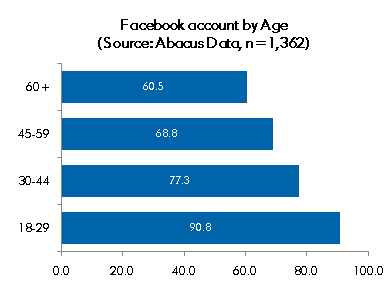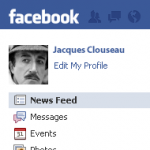Published: January 17, 2011
Canadians of all ages are flocking to social media giant Facebook, according to a new study by Ottawa-based market research firm, Abacus Data. Figures collected during December 2010 suggest that nearly three-quarters of Canadians maintain accounts with Facebook. While that figure on its own may not be surprising, the breakdown of users may be unexpected for some.
“It’s very common to hear of a generational gap in social media use, but these results show that that gap is more of a gradient – the real gap is in how the different generations use social media” said Alex Monk, a strategist at Abacus Data and author of the report. Curious? Continue reading

Source: Abacus Data
Published: October 19, 2010

Drivel on Facebook more valuable than we think
Superficial contacts on Facebook, apparently unnecessary comments, and banal status updates may be more worthwhile than we think. This is shown in a new report from the National IT User Center. The report also predicts the new social media will ultimately lead to more individual entrepreneurs.
Many people are critical of those who collect hundreds of so-called friends on Facebook. Often the majority of these “friends” are old classmates, acquaintances of acquaintances, and the like, relationships that are fundamentally weak. The comments and updates of relatively banal nature that appear on Facebook have also generated a great number of snide remarks, not least in the media, in recent times. But a report compiled by Håkan Selg, a doctoral candidate at the Department of Information Technology, Uppsala University, reveals that these contacts in fact constitute highly useful networks, networks that make use of the ostensibly meaningless comments and updates. [continue reading…]
Time Magazine takes a look at parenting and what our kids choose not to share with us.
Most parents, if we’re honest, can spot our own fingerprints at our children’s crime scenes. When Ethan lies about handing in his homework, when Emma sneaks her phone for late-night texting, they’re often rebelling against pressures that come at least partly from us. This is not to defend their actions, only to remind us that if we act as if we don’t trust our kids, it may invite them to be less trustworthy. Most of us were probably less than immaculately honest as teenagers; it’s practically encoded into adolescence that you savor your secrets, dress in disguise, carve out some space for experiments and accidents and all the combustible lab work of becoming who you are.
Read more
Source: Time
We’d love to hear what you think.
 In the July online issue of Scientific American, Valerie Ross asks the question: Are Facebook profiles an accurate reflection of people’s personalities?
In the July online issue of Scientific American, Valerie Ross asks the question: Are Facebook profiles an accurate reflection of people’s personalities?
Social-networking sites are a way to find out about people you’re curious about but have never met—say, a prospective employee you’re deciding whether to hire. But when you scan someone’s profile, you probably expect a little fudging: an overly flattering photograph, a generously phrased blurb in the “about me” section. A study in the March issue of Psychological Science, however, suggests that Facebook users do not skew their profiles to reflect idealistic visions of themselves link to continue reading
Source: Scientific American



